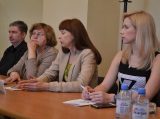Roundtable Related to Religious Extremism Held at ASU
 15.06.2016
15.06.2016
On June 10, 2016, the roundtable “Religious Extremism in Caspian Littoral & Central Asian Countries” was held at Astrakhan State University. The Center of Eurasian Political Research arranged this event.
According to Astrakhan Region’s law-enforcement authorities, the number of crimes of extremist character is growing. Only in 2015, twenty-four criminal cases were initiated; they dealt with recruitment to terroristic organizations, promotion of prohibited literature, and sponsoring extremist organizations.
Rauf-khazrat Dzhantasov, Chairman of the Astrakhan Regional Spiritual Directorate of Muslims, gave his welcoming speech. He emphasized a good coincidence – the roundtable took place during the sacred Muslim month of Ramadan.
Mr. Andrey Syzranov, Chief of the Center of Eurasian Political Research of ASU, gave the main report. He pointed out that a wide spread of ideas of religious radicalism in Russia at the turn of the centuries resulted in emergence of an increasing number of Islamist organizations that aim to promote and perform extremist activities. They aim to destabilize ethnic and confessional relations in Russia, and they are surely the most dangerous form of present-day extremism in Russia. Young people (both local people and immigrants from Central Asia and the Caucasus) joining those organizations are involved in various types of extremist activities. Extremist ideas are actively promoted everywhere – from printed materials to web sites and social networks.
Mr. Eldar Idrisov, a political researcher, pointed out that a complex approach should be applied to analyze extremism. In his opinion, the social role of the clergy is crucial for prevention of radical religious fundamentalism among the religious community.
In her turn, Prof. Lyudmila Baeva, Dean of Astrakhan State University’s Department of Social Communications, remarked that extremism implies an aggressive way to solve problems and that its particular elements may be found in any religion. At the same time, tendency to extremism is also a specific need that some people have.
The agenda of the roundtable also included a presentation of findings of a sociological survey executed by the Doverie Center of Social & Psychological Assistance. Its staff headed by Dr. Marina Potapova (Director of this Center) revealed that young people’s addictive behavior is often a psychological base to promote extremist ideas.
On behalf of police authorities, Mr. Nikolay Suslov from the Center of Counteraction against Extremism of Astrakhan Region’s Directorate of the Ministry of Internal Affairs, remarked in his response to a TV journalist’s question that even though Astrakhan Region is close to areas where extremism is performing actively, it is relatively calm. One of the primary reasons for that is efficient activities of law-enforcement agencies. Mr. Suslov also said that religious education among kids and teenagers could definitely contribute to struggle with extremism.
At the end of the roundtable, there was a presentation by Mr. Alexander Vassilyev, Chief Editor of the Astrakhan-24 TV channel, which concerned impact of religious and political processes taking place in the Middle East upon the current situation in Russia.
After this presentation, the participants of the roundtable approved their resolution, which indicated that extremism is an acute problem of the modern society and that struggle with extremism requires a systematic and complex approach, including preventive activities aimed at young people. Outcomes of this roundtable shall be used to hold a video conference, which the Astrakhan-24 TV channel is to deliver by involving our colleagues from Kazakhstan and Kirgizia.


.jpg)
.jpg)
